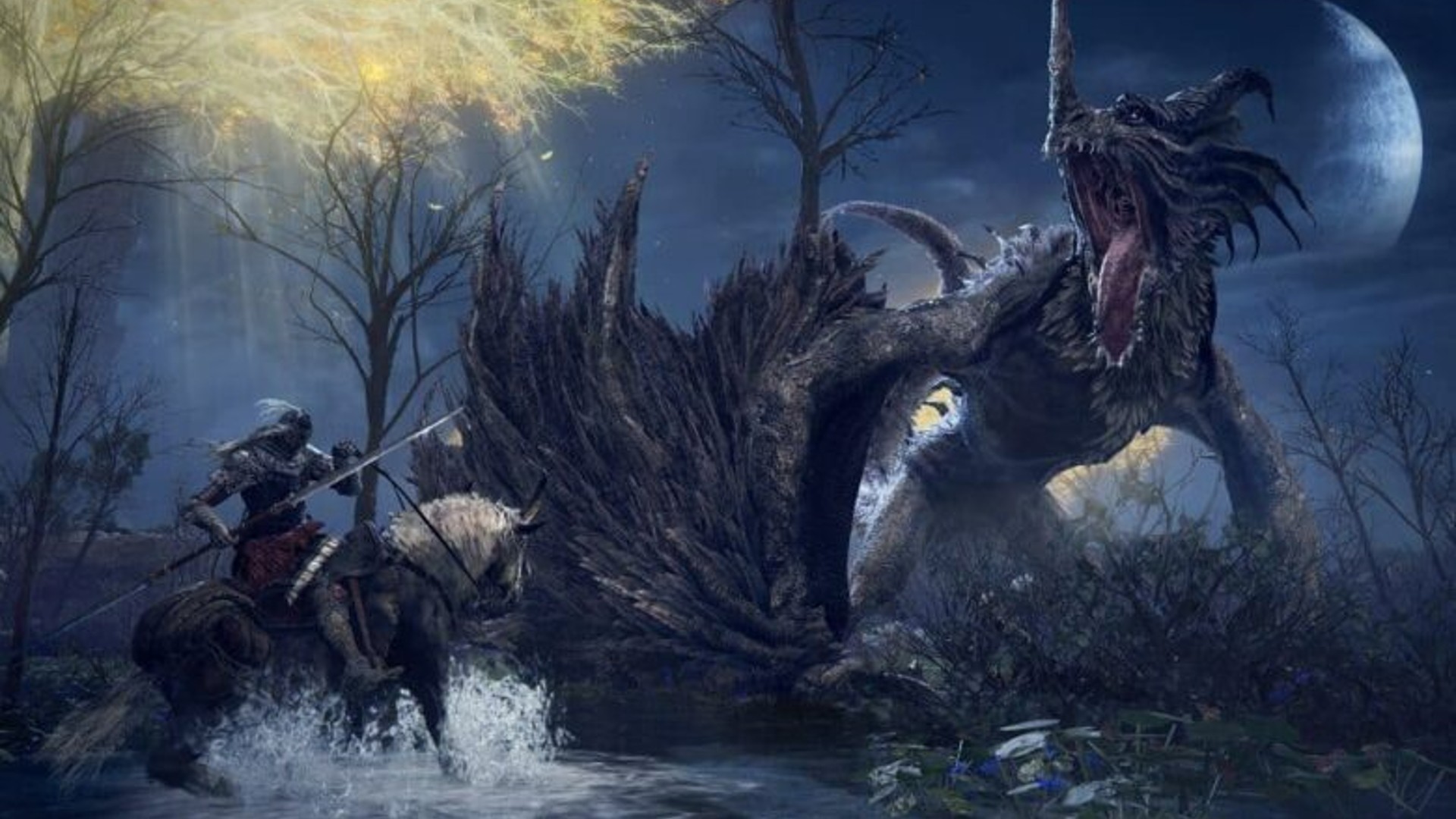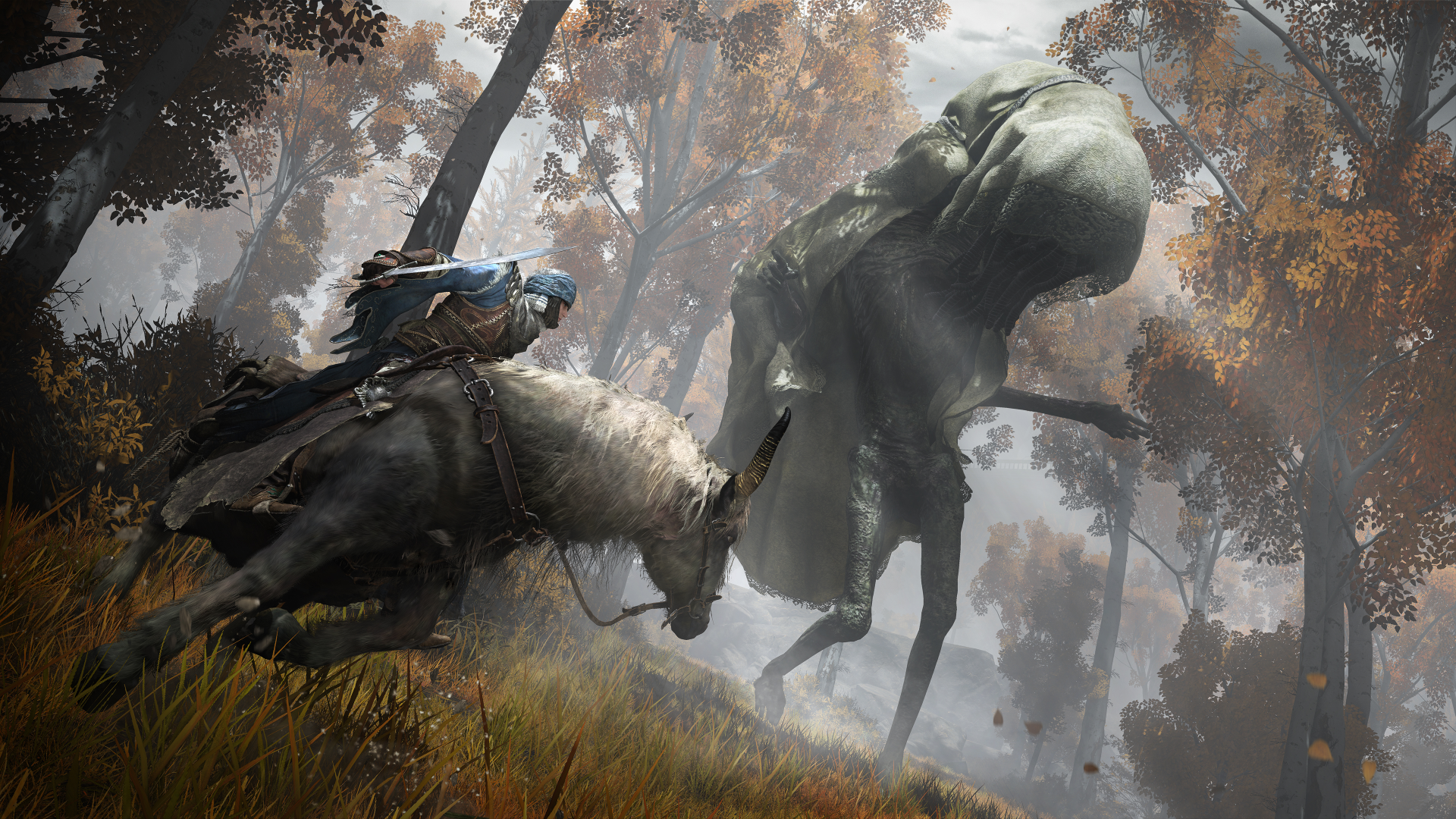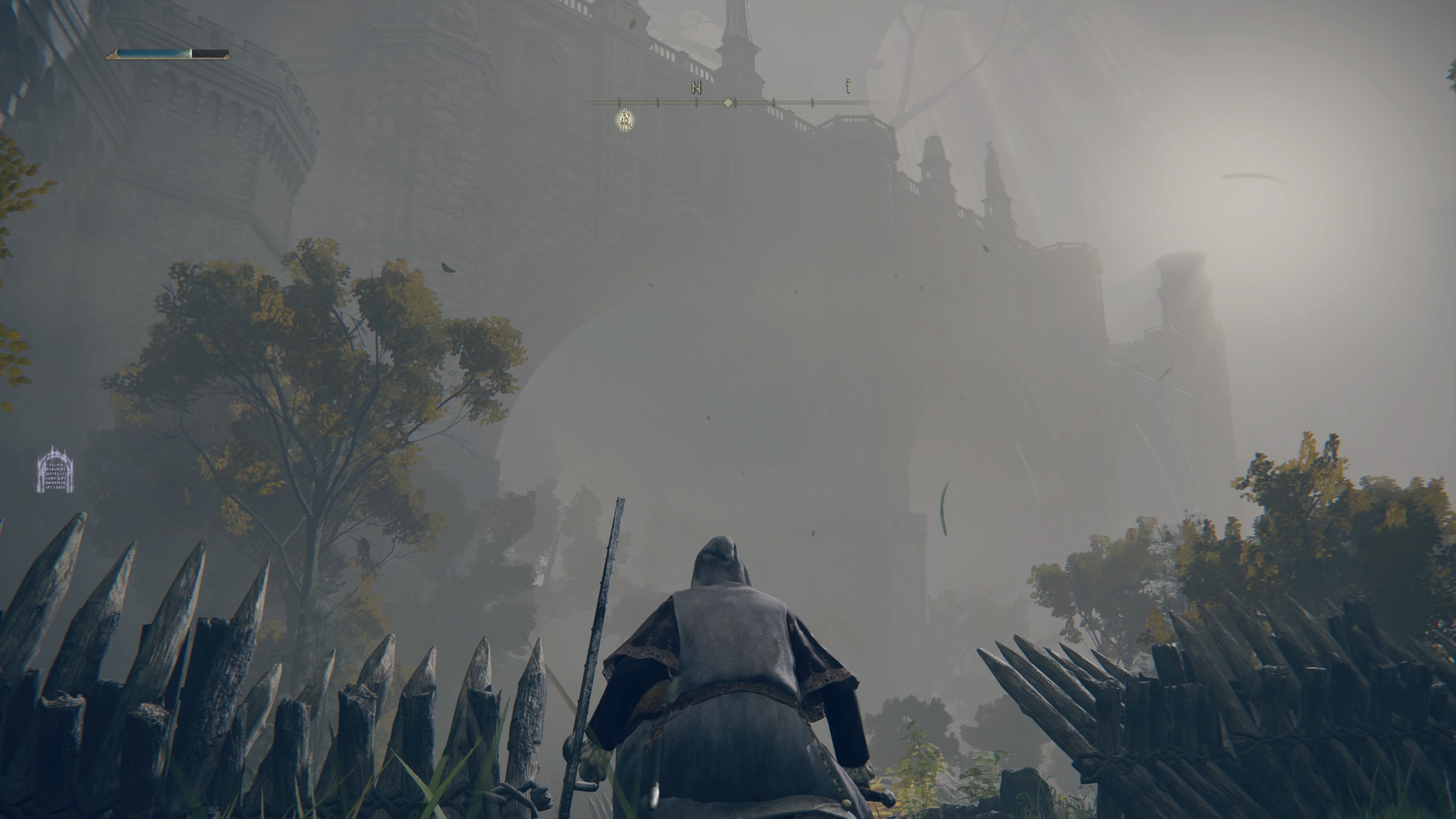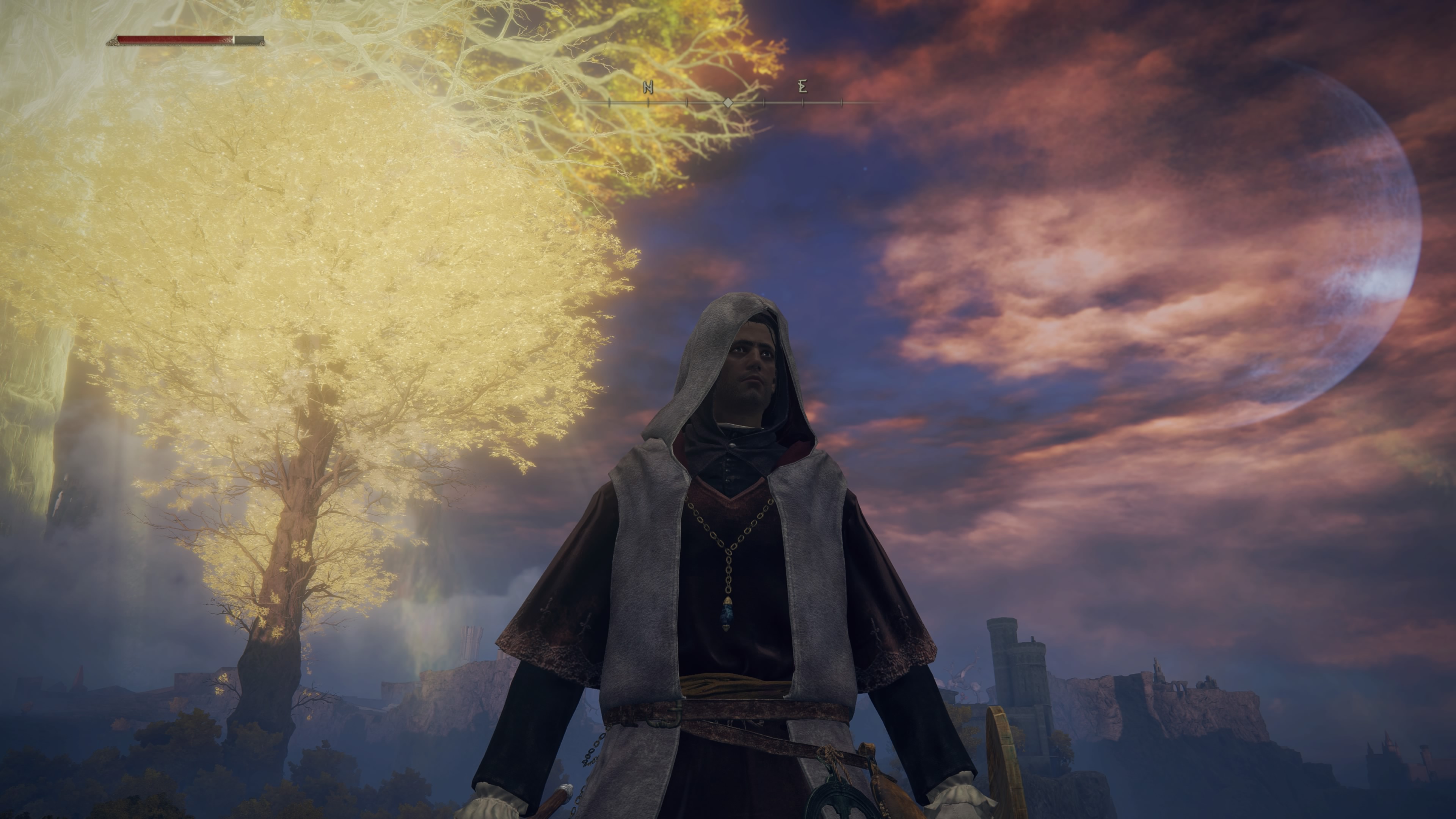Does Elden Ring have what it takes to become this generation's Skyrim?
It's early days for Elden Ring, but could we end up spending as much time here as in Skyrim?

The path to Elden Ring feels like a job application. Demon's Souls was the cover letter, it offered an approximation of what it could bring to the table if given the time and resources. Dark Souls was the first-stage of interview: first impressions were formed, personalities were defined, expectations were set. Dark Souls 2 was the competency test, in that it didn't really tell us anything new but the boss was out of the office so it made sense at the time. Dark Souls 3 was the second interview, it presented a clearer, streamlined vision and drove home its ideas. Bloodborne was the cursory social media check and it was batshit mental. Sekiro was the probation period: brilliant, but rigid and a wee bit too scared to push beyond its boundaries.
With Elden Ring, it appears FromSoftware has learned something important from every one of its past Souls and Souls-adjacent games over the last 13 years. The developer has done such a fine job of pulling the best parts from its previous outings, in fact, that Elden Ring is now a 97-rated game on Metacritic, placing it alongside the likes of Grand Theft Auto 5, Halo: Combat Evolved, and The Legend of Zelda: Breath of the Wild. It even sits one point above action-RPG juggernaut The Elder Scrolls 5: Skyrim, which, over the last decade, has sold upwards of 30 million copies. Comparing Bethesda's long-standing, fantasy role-player – one that's received a generous amount of DLC, special editions, and thousands of inventive player-made mods – to the George R.R. Martin-approved hype train that's driving Elden Ring at the moment, I can't help but wonder: does Elden Ring have what it takes to become this generation's Skyrim?
Early days


Purists will disagree, but Elden Ring is at its absolute best with stealth and magic
Elden Ring has been with us for just a handful of days at this point, so I might be jumping the gun. But it has wowed with sparkling reviews across the board. It's also FromSoftware's most successful physical launch game by a distance, as reported by GamesIndustry.biz, something that I'm sure will translate to digital sales over the course of the week. The buzz around the game is hard to ignore on social media too, and its big-budget marketing fills websites and YouTube ad slots at every turn – its algorithm stalking me closer than a stealthy mage camped in the bushes. I am, admittedly, a dyed in the wool Souls fan, but, since Elden Ring's arrival, I'm increasingly having conversations with folk about the Lands Between who I never would have pegged for a visit before.
All of which makes this feel, even at this early stage, like FromSoftware's first proper foray into the mainstream. Demon's Souls was a cult classic – latterly remastered by then third-party outfit Bluehole over 10 years later – and Dark Souls harnessed much of that 'flawed gem', underground prestige right up until, I reckon, its Remastered edition of 2018. Between times, PS4-exclusive Bloodborne (2015) and Dark Souls 3 (2016) pushed FromSoftware's name and ruthless style to a much bigger audience than ever before, whereas Sekiro: Shadows Die Twice (2019), even with the unlikely backing of Activision, felt like a sideways step given its especially niche setting and era. Elden Ring, following a protracted development, a couple of delays, a closed network test and, again, a solid marketing campaign, takes centre stage having built on every step of the way to this point. Skyrim, having expanded upon the ideas and outlook of its four predecessors, chiefly Morrowind and Oblivion, of course, did the very same.

"Skyrim, having expanded upon the ideas and outlook of its four predecessors, chiefly Morrowind and Oblivion, of course, did the very same."
From an official support standpoint, it feels inevitable that FromSoftware will grow Elden Ring over time, in the same way it has its previous action-RPGs, with official DLC loosely tied to their base games' overarching narratives. Like Skyrim's Dawnguard and Hearthfire expansions, the likes of Dark Souls 3's Ringed City and Ashes of Ariandel provided players with new deadly playgrounds to explore, brimming with new enemies and headed by new, twisted bosses. Long-term support for online play in Elden Ring will likely take care of itself, similar to past Souls games, wherein players can play through the entirety of the game on their lonesome, or call upon random player-controlled NPCs at the fog gate of every boss fight if they so choose. Yellow summon signs cover well-trodden areas at the moment, such as The First Step's Site of Grace and ahead of Margit, the Omen Fell, but I've really struggled to find help next to the Godrick the Grafted boss arena. It'll be interesting to see how easy it is to matchmake once this initial burst of excitement calms down.
Longer term, much like Skyrim, mods will play a crucial role in Elden Ring's longevity. Nexus Mods is already filling up with reshaders and subtle quality of life tweaks, with character models from previous Souls games thrown in for good measure. Skin mods, like this Ostrava of Boletaria from Demon's Souls, will likely continue to crop up before more sophisticated script projects begin to creep in. Enderal, Falksaar, Bruma, and the in-progress Skyblivion are all remarkable total conversion mods for Skyrim, to this end, and the likes of Nightfall – an ambitious incoming Dark Souls total conversion project that looks great – show what might be possible for Elden Ring. For example, altering the player's starting location, from Caelid to Limgrave, puts a whole new spin on the overworld; while Pause the Game does exactly that, affording players a quick breather mid-fight and totally altering the pace of combat. Just imagine what might be possible in a year or two's time.
And we surely can't forget the subcultures that have flourished in Souls games over the last 13 years. From Fashion Souls to Fight Clubs, intuitive players have used FromSoftware's games against the grain and as a means of expression – the former existing to dress their avatars in the rarest, most extravagant outfits before parading them in spontaneous contests hosted all over the game world; the latter meeting in groups to wrestle to the death while adhering to a very strict code of honour. Seriously, chug an Estus/Flask of Crimson Tears mid-dual at your peril. If the gladiator facing you doesn't sort you out, the otherwise idle bystanders will, I can assure you.
Sign up to the GamesRadar+ Newsletter
Weekly digests, tales from the communities you love, and more
Incidental floss

"My fondest adventures have been the unscripted ones, where I've inadvertently happened upon an NPC with a story to tell, or I've been ambushed and cornered with no Site of Grace in sight."
Lordran, Drangleic, Lothric, Yharnam: all of these worlds make players feel insignificant. While roaming their murderous peaks and death-defying troughs, there's an abiding sense that these worlds would, could, and do persist with or without the player's presence – something underlined by the fact enemies resume their patrols and routines the moment the player is killed. Albeit within a less disparate and hopeless playground, the same can be said of Skyrim where, despite the circling dragons above and the wizards spouting fire from their palms on the ground, the world lives and breathes around the player. It feels real, or at least rooted in realism, and its sheer scale and the randomness of its inhabitants and your encounters with them is partly why players are still roving its picturesque plains over 10 years on.
From a design perspective, Elden Ring feels the same, where, like FromSoftware's back catalogue, virtually nothing is signposted and must be uncovered by intrepid exploration and, often, by accident. In my own 15 or so hours with Elden Ring so far, my fondest adventures have been the unscripted ones, where I've inadvertently happened upon an NPC with a story to tell, or I've been ambushed and cornered with no Site of Grace in sight. FromSoftware games have never held their players' hands, and the scope for longevity as players tease out its secrets over time seems at this stage huge.
Whatever the future holds for Elden Ring, what is clear is how big it is right now. The sale figures, the review scores, the chatter on social media, its aggressive marketing – these factors paint only part of the picture. But perhaps a bigger indicator of just how big Elden Ring is, is how FromSoftware has been forced to react to bugs and glitches, some of which, especially on PC, are game-breaking. It's a bit of a running joke among fans that Souls games can be as broken as they are brilliant. But when dealing with the masses – players who don't come to Elden Ring with a long-standing affection for the Souls series, and who aren't willing to overlook rough edges – those flaws stand out like a sore furled finger. FromSoftware appears to be coping okay from the outside looking in, but how Elden Ring managed to ship on PC without recognising certain machines' graphics cards is a strange one for sure.
These are but teething issues, of course, and the same type of minor hiccups that affected some of the best games in the business, Skyrim included. No matter how you spin it, Elden Ring is enjoying a boom within its (site of) grace period, and is still employee of the week. And that's impressive. The question is: where will it be in one, two, five or ten years' time? For my runes' worth, it's got every chance of being right up there at the top.
Is FromSoftware's latest worth all the hype? Check out our Elden Ring review and learn why "suffering has never been so much fun".

Joe Donnelly is a sports editor from Glasgow and former features editor at GamesRadar+. A mental health advocate, Joe has written about video games and mental health for The Guardian, New Statesman, VICE, PC Gamer and many more, and believes the interactive nature of video games makes them uniquely placed to educate and inform. His book Checkpoint considers the complex intersections of video games and mental health, and was shortlisted for Scotland's National Book of the Year for non-fiction in 2021. As familiar with the streets of Los Santos as he is the west of Scotland, Joe can often be found living his best and worst lives in GTA Online and its PC role-playing scene.


